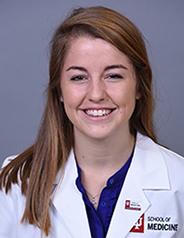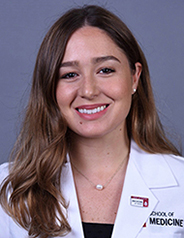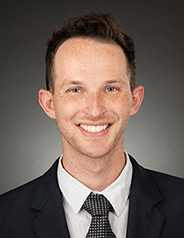By Cindy Dashnaw
February 21, 2022
Indiana University Melvin and Bren Simon Cancer Center’s 2021-22 William J. Wright Scholarships have been awarded to three cancer researchers who see a direct line from research to improved patient care: IU School of Medicine students Mary Ann Etling, Victoria Sanchez and Andre Woloshuk.
Each scholarship carries a financial reward and the expectation that the recipient will devote at least two months to a cancer-related project during their school year – projects ranging from lab experiments to health outcomes research to cancer awareness programs.
This year’s Wright winners have conducted research all over the globe but share one common trait: the desire for their work to improve patients’ quality of life.
Mary Ann Etling
Mary Ann Etling aims to become a "fiery" pediatrician and researcher who supports children in areas with limited access to medical resources.
“Many people say pediatricians are kind and friendly. That may be true, but the pediatricians I know are fiery, passionate, and unafraid to do whatever it takes to advocate for children in need of equitable care,” she said. “That is the kind of doctor I hope to be.”
A Fulbright scholarship to northern Uganda brought her face to face with what happens when people don’t have access to quality healthcare.
 Etling
EtlingMany families openly shared challenges they faced due to a lack of resources, and I became deeply invested,” Etling said. “I witnessed several instances of injustice in terms of barriers to equitable healthcare. For example, when children with sickle cell disease needed a blood transfusion, we often scrambled to find even one bag of blood as there was a national blood shortage. It is hard to reconcile when we know that children in some parts of the world have access to life-saving measures while others do not.”
Etling said she’s always felt a responsibility to care for others. Growing up in Terre Haute, Indiana, she watched her father lead a nonprofit that provides families with food, shelter, clothing, and emergency resources. Then, a childhood friend’s battle with cancer steered her toward medicine.
The friend, Patrick, was diagnosed with Ewing sarcoma when the two were in seventh grade. Their friendship deepened through the years, and they started college dreaming of becoming doctors. But Patrick was diagnosed with osteosarcoma in their first semester, and he passed away the following year.
“Patrick would have made an incredible physician. He loved the chemistry and the genomics, but he also loved loving people and making them laugh. My hope is to be like he would’ve been,” Etling said.
Now a third-year medical student on a general surgery rotation in her hometown, Terre Haute, Indiana, and vice-chair of the Indiana University Student Outreach Clinic, Etling is part of Project ECHO with IU School of Medicine Drs. Tyler Severance and Terry Vik. They are improving pediatric cancer diagnoses in western Kenya through a telehealth platform.
“Project ECHO empowers local physicians and clinical officers to detect cancer, initiate treatment, and hopefully improve outcomes for children. The whole idea is brilliant,” Etling said. “One of the difficult things about cancer is that it can grow and spread if not detected early, worsening the prognosis. Project ECHO is committed to the case-based continuing education of healthcare professionals to improve cancer screening in children. If it works well, Project ECHO could lead to life-saving diagnoses.”
The Wright Scholarship will enable Etling to evaluate the outcomes of the Project ECHO initiative.
“There is still so much we don’t know about cancer, and research informs more comprehensive screening techniques and novel treatments that can save lives,” she said. “I believe that to devote one’s life to alleviating the burden of cancer means becoming immersed in research studies, fundraising campaigns, clinical trials, and knowing our patients’ names and stories. I hope to learn as much as possible so I can be of service to children and their families one day.”
Victoria Sanchez
 Sanchez
SanchezFrom the time she entered her first research lab, Victoria Sanchez of Miami, Florida, recognized the power of translational research.
"A formative experience for me was working on Dr. Edjah Nduom’s first-in-human clinical trial for recurrent glioblastoma patients,” Sanchez said. But it was while writing a review article at the National Institutes of Health that she became fascinated with the prospects that CAR T-cell therapies hold for cancer patients.
“This is a form of cell therapy where a patient’s immune cells are harvested and genetically modified to recognize and attack their cancer,” Sanchez said. “It’s the reason I’m working with IU School of Medicine’s Dr. Fabiana Perna today.”
Gaining another experience in precision medicine at Harvard’s Visiting Research Internship, she worked on identifying non-invasive molecular biomarkers in brain tumors as part of Dr. Alexander Lin’s lab at Brigham and Women’s Hospital. She soon approached Dr. Perna about how she could become involved with her lab.
“Many of my cancer research interests are rooted in immunology and precision medicine. The work I am doing now in Dr. Perna’s lab focuses on the discovery of novel targets for adoptive cell therapy,” Sanchez said.
Cancer patients are an extremely vulnerable population, she said.
“Many are categorized as non-responders, a misnomer ascribed to patients when a treatment is ineffective for them,” she explained. “Being part of a team that helps discover therapies targeted to a person’s tumor-specific mutations is what keeps me coming back to this kind of research.”
She emphasized that her opportunities wouldn’t have been possible without the exceptional mentorship she’s received through the years. Now, her goal is to be a surgeon-scientist who contributes to the development of therapies that will improve cancer patients’ lives.
“A scientific discovery is a wonderful achievement, but if we can’t make a novel therapy accessible to all patients, then our work is far from complete. Making our immunotherapy gains accessible to the patients who need them is a goal I hope to accomplish in my career,” she said.
The Wright Scholarship means she can devote herself to using expression data and genetic models for novel CAR T-cell target discovery against mesenchymal tumors.
“We’re still in the rudimentary stages, but I’m very excited about the work. There are so many possibilities at the start, so I’m eager to see how our project goals evolve in the next year.”
Andre Woloshuk
Andre Woloshuk of West Lafayette, Indiana, believes physicians should base their recommendations to patients on data. The more research published on urologic cancer – Woloshuk’s specialty – the more vital the physician becomes in matching a patient’s goals with available treatment options, he said.
“As medicine becomes better and better at identifying cancer in its early stages, urologists have become experts in providing safe treatment options that preserve a person’s ability to do the things they love,” he said.
Woloshuk, who will train at UT Southwestern for his urology residency, started his IU School of Medicine career as a former Fulbright Scholar, an accomplished researcher, and the co-inventor of a multi-axis prosthetic ankle that’s affordable for people in developing countries who lose a foot. But he’s spent most of his time on research related to predicting cancer outcomes in patients with prostate cancer.
 Woloshuk
Woloshuk“Specifically, we’re looking at factors that affect both the biological and technical aspects of cancer care and how that impacts recurrence,” he said. “Our main area of interest is the prostate gland size, which varies widely in patients with prostate cancer, and how size affects the ability to predict which patients are good candidates for surgery.”
Woloshuk started researching prostate cancer with Dr. Ronald Boris, associate professor of clinical urology at IU School of Medicine and a member of the cancer center, back in 2020.
“Being able to watch his approach to patient care has been invaluable to my medical education,” Woloshuk said. “Dr. Boris continuously provides meaningful feedback and encourages me to focus my research questions on clinically important decisions. Our project and interactions have been formative in my decision to pursue oncologic research and urology.”
The Wright Scholarship has provided Woloshuk more time to focus on their project and ensure the scientific community can share in the results.
“IUSM has an excellent record of providing students with support and wonderful preclinical and clinical education. It’s exciting to train at a place with such a breadth of faculty and experiences,” he said. “I’ve found my time spent with the IU urology team to be a continually reinvigorating experience. From the patients to residents to staff physicians, I’m consistently reminded why I decided to pursue medicine in the first place. Plus, having excellent mentors and support help me focus on meaningful work.”
The COVID-19 pandemic hasn’t stopped researchers and physicians from supporting students or delivering quality patient care, said Woloshuk.
“We’ve had to accommodate staffing shortages, operating-room scheduling, and virtual visits. So many patients were uncomfortable with in-person follow-up appointments or unable to come in. I’ve experienced firsthand the importance of adequate follow-up and continuity of care.”
Cindy Dashnaw finds and tells nonprofit stories that inspire audiences to share, show up and support. She honed her ability to craft a message that fits an audience during 20 years in nonprofit PR and communications. Now a freelancer, she's a copywriter and a storyteller for nonprofits across the United States. And she earned her degree from IUPUI.




